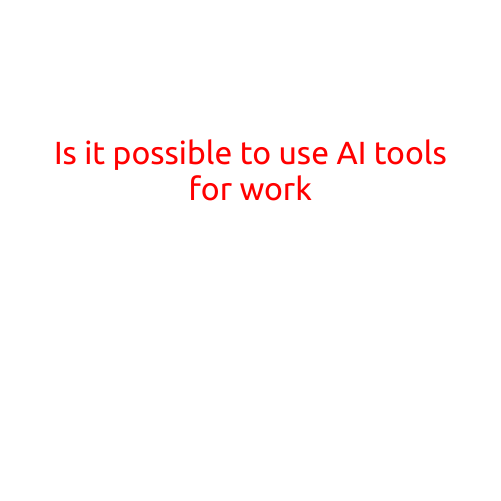
Is it Possible to Use AI Tools for Work?
The rapid advancement of artificial intelligence (AI) has opened up new possibilities for businesses and individuals alike. With AI tools becoming increasingly accessible and user-friendly, many wonder if it’s possible to use AI for work. In this article, we’ll explore the capabilities of AI in the workplace and discuss the benefits and challenges of integrating AI into your professional life.
What Can AI Tools Do?
AI tools are designed to assist and augment human capabilities, freeing up time for more strategic and creative tasks. Some common applications of AI in the workplace include:
- Data Analysis: AI tools can quickly analyze large datasets, identifying trends, patterns, and insights that might be difficult or time-consuming to detect manually.
- Automation: AI can automate repetitive and mundane tasks, such as data entry, scheduling, and customer service, allowing employees to focus on higher-value tasks.
- Customer Service: AI-powered chatbots can provide 24⁄7 customer support, answering common questions and resolving simple issues efficiently.
- Content Generation: AI tools can create high-quality content, such as blog posts, social media posts, and reports, reducing the workload for content creators.
- Predictive Maintenance: AI-powered predictive maintenance can detect equipment failures and schedule maintenance before they occur, reducing downtime and increasing productivity.
- Cybersecurity: AI-powered cybersecurity systems can detect and respond to threats in real-time, protecting sensitive data and networks.
Benefits of Using AI in the Workplace
Integrating AI into your work can bring numerous benefits, including:
- Improved Productivity: By automating repetitive tasks and freeing up time for more strategic work, AI can increase employee productivity and efficiency.
- Enhanced Accuracy: AI tools can reduce errors and inaccuracies, ensuring that tasks are performed to a high standard.
- Cost Savings: AI can help reduce labor costs by automating tasks and reducing the need for human intervention.
- Competitive Advantage: By adopting AI, businesses can stay ahead of the competition and establish themselves as leaders in their industry.
- Improved Decision-Making: AI can provide valuable insights and data analysis, helping employees make more informed decisions.
Challenges and Considerations
While AI offers many benefits, there are also challenges and considerations to keep in mind when integrating AI into your work:
- Job Displacement: The automation of tasks may displace certain jobs, requiring workers to adapt to new roles and responsibilities.
- Data Quality: AI tools rely on high-quality data to produce accurate results. Poor data quality can lead to inaccurate outputs and decision-making.
- Ethical Considerations: AI system bias, privacy concerns, and job displacement must be carefully considered when implementing AI in the workplace.
- Training and Adoption: Employees may require training and support to effectively use AI tools and adapt to changes in their roles.
Conclusion
In conclusion, AI tools can be a valuable addition to many industries and professions. By automating repetitive tasks, providing data insights, and improving decision-making, AI can increase productivity, accuracy, and competitiveness. However, it’s essential to consider the challenges and potential job displacement that AI may bring. By adopting AI responsibly and thoughtfully, businesses and individuals can reap the benefits of this powerful technology while minimizing its negative impacts. Will you be using AI tools in your work? Share your thoughts in the comments below!





